Bitcoin has become the most exciting phenomenons of the 21st century thus far. I've been following Bitcoin since early 2010 when they were worth no more than $8. Now (3 years later) a single bitcoin will set you back $1,072 USD. I never bought any bitcoins and now I wish I had.
I've been fiddling around with bitcoin mining for a few years but never took it seriously enough to earn a block reward. Back in 2010 the concept was so foreign to me. In 2011 I just didn't have the hardware or computing power to do anything useful. The point is, I missed out. I am however interested in the alternatives.
There are several other "alt coins" as they are called that can still be mined with a low hash rate. My favorite as of this moment is one called Zetacoin. My computer hardware still isn't good enough to do any useful block finding, but in the last year an a half there have been some significant developments with mining hardware. It used to be you would need a complicated setup of several GPU's or FPGA's to do mining. Today we have ASIC's designed for the task. The most user friendly of them being the USB Block Erupter:
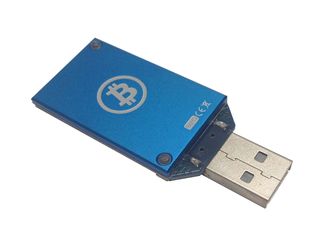
It's cute little device that is inexpensive. I purchased a few for about $10 to $30 each off of eBay, most new and some used. They use about 510-550mA of current at 5v, that's a little over 2 and a half watts of power each. One or two of these is a great way to get started but to do some serious mining, you'll need several.
I decided to buy 28 of these guys. That means I'll need a USB hub that can provide a constant steady flow of current to each device. Most USB hubs can't garentee 510mA on each port. The average 7 port USB 2.0 hub can only supply up to 2 amps for the entire device, meaning less than 300mA per port.
No, instead I had to purchase a specialzed piece of equiptment:
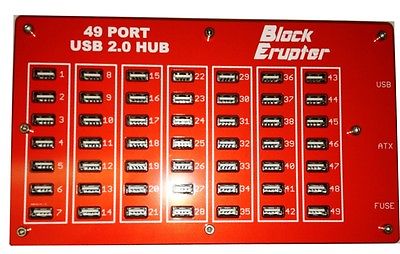
Yep, pretty impressive. This 49-port USB hub will supply enough current to each USB port, thereby allowing you to run up to 49 USB miners on a single USB port. This device is expensive, buggy, and very unfriendly to use. It will set you back about $200.
You need an ATX computer power supply to power this thing, and not just any power supply will do. The power supply will need to provide at least 30 amps on the 5v Rail (the ATX connector). I upgraded my power supply last year to a 1200W Antec from a 800W Antec, so I happen to have one laying around. This 800W Antec power supply is only 25A but is more than sufficient for my needs since I only have 28 block erupters.
Once I had all the equitpment, the miners, the hub, the power supply, UPS, and some fans I was ready to put it all together:
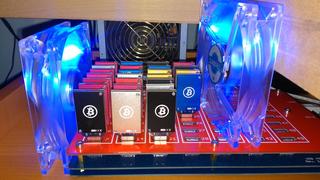
The current total hash rate is about 10Gh/s. I've been able to genrate more than 40,000 Zeta coins in a period of 3 weeks. At the moment it's being driven by a MacMini, but this will be soon replaced by a Raspberry Pi 2.0 Model B computer. The total power usage is about 120 watts:
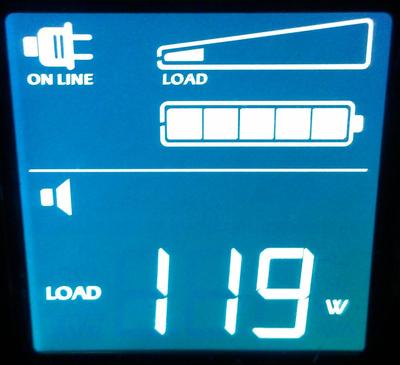
I suppose that will go down significantly with the Raspberry Pi. The UPS is an APC NS-1350. I should get about 30 minutes of run time at the current load during a power outage.
I'm using BFG Miner on my own private mining pool running on my FreeBSD server. Here's a screenshot of BFG miner:
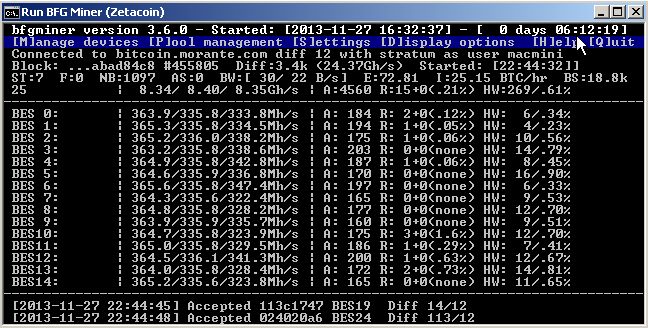
I've only had 25 miners up when this was taken. Here is a shot of the web based stats:
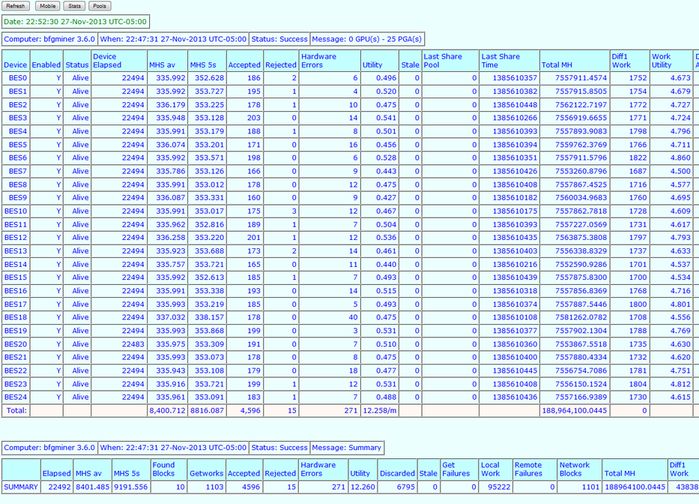
You can see that the hash rate bursts from time to time, but it is very close the the specification (336MH/s per device). I've ociasionally seen the cumlative rate surpase 14GH/s.
I've been able to solve lots of Zetacoin blocks with this setup. Here's a screenshot of my Zetacoin wallet with the earnings thus far:
Zetacoins aren't worth very much at the moment. As of late 2013 one zetacoin is equal to 0.000004 bitcoins which amounts to less than half a cent in USD when converted at bitcoin's value. I'm not doing this for profit, just for the fun and learning experiance. I don't plan on trading my coins anytime soon though.
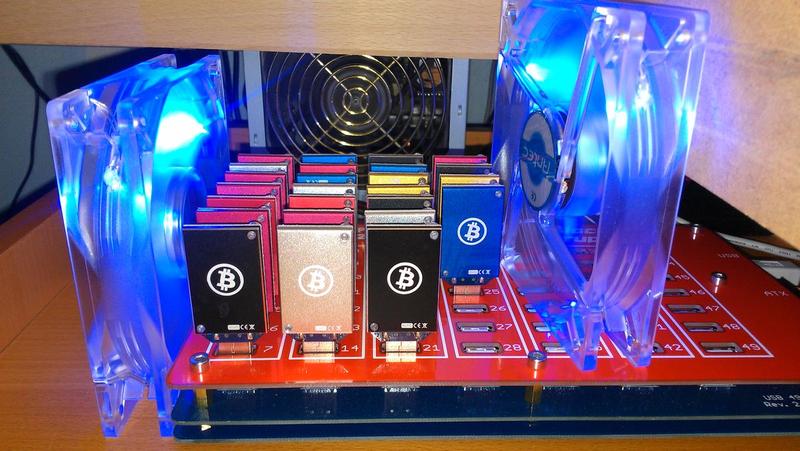
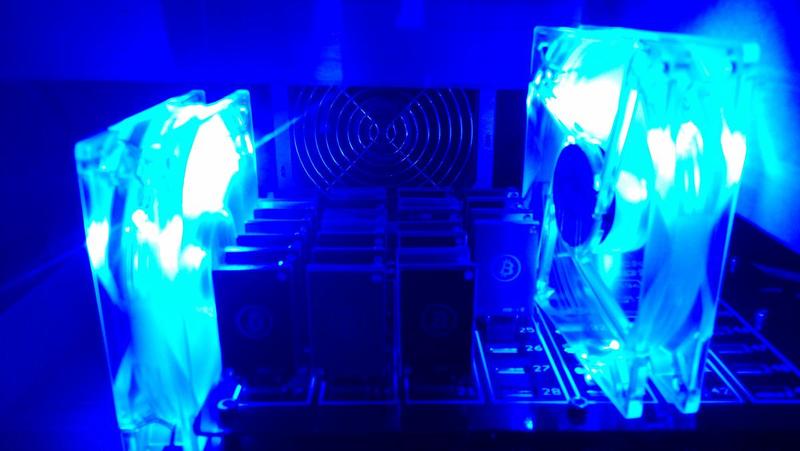
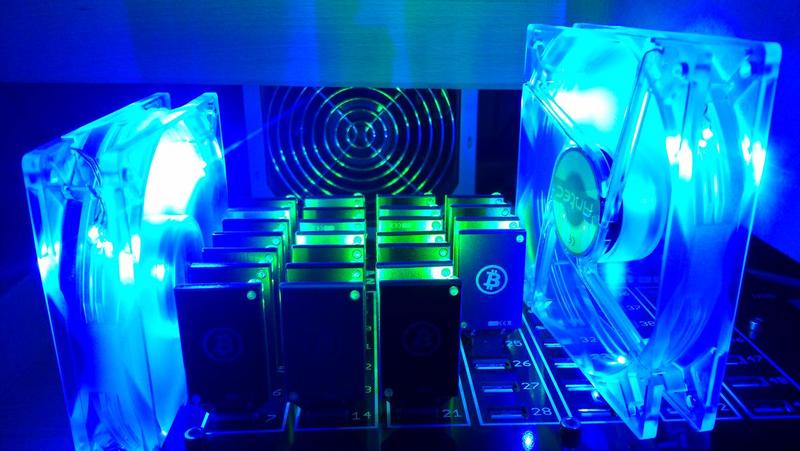
- Log in to post comments


.png)